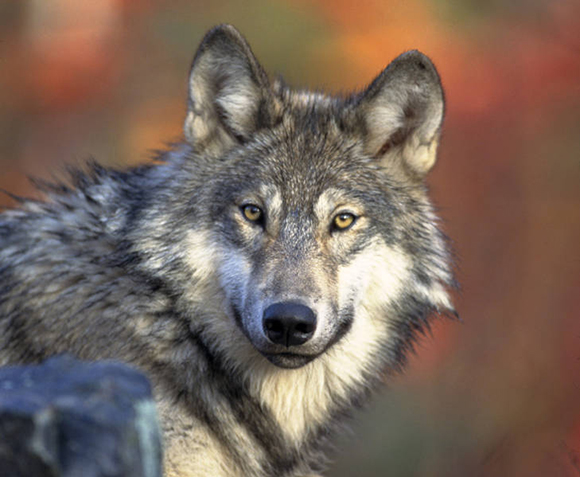
Gray wolf Credit: Gary Kramer/USFWS
October 26, 2025 - SIERRA VALLEY – Following an unprecedented level of livestock attacks across the Sierra Valley, the California Department of Fish and Wildlife (CDFW), in coordination with the U.S. Fish and Wildlife Service (USFWS), has taken the difficult step of lethally removing four gray wolves (Canis lupus) from the Beyem Seyo pack. This action follows months of intensive non-lethal management efforts to reduce livestock loss and is grounded in the best available science and understanding of wolf biology.
Between March 28 and Sept. 10, 2025, these wolves were responsible for 70 total livestock losses. With 110 confirmed or probable wolf-caused livestock losses statewide during this period, these specific wolves account for 63% of the total livestock losses across California during this timeframe. From Sept. 10, 2025, to Oct. 14, 2025, 17 additional confirmed or probable livestock losses have been documented. CDFW continues to work with livestock operators and federal partners to investigate depredation events.
Despite extensive adaptive management deterrence efforts, including the use of drones, non-lethal bean bags, all-terrain vehicles, foot presence, diversionary feeding, fladry installation, and field presence 24-hours a day, seven days a week, these wolves became habituated to cattle as a primary food source, a behavioral shift that threatens both livestock and the ecological integrity of wolf recovery.
The impacted wolves included a breeding pair (WHA08M and LAS23F), female (BEY01F) and male (BEY12M). During the course of the operation, a juvenile wolf (BEY12M) was mistaken for the breeding male (WHA08M), which was of similar color and size, and was unintentionally lethally removed. Remains of two additional juveniles in this pack (BEY15M and BEY17M) were found and they were determined to have died prior to the start of the operation. The cause of their deaths is unknown; however, juvenile gray wolf death due to natural causes is common. Operations continue by CDFW staff to safely capture and relocate the outstanding juveniles to wildlife facilities for their own welfare and to prevent any learned behavior from dispersing to other wolves across California.
Gray wolves naturally prey on wild ungulates like deer and elk, not livestock. These wolves had become habituated to preying on cattle, a feeding pattern that persisted and was being taught to their offspring which would leave to form their own packs and could teach them the same cattle-preying behavior. This shift not only undermines recovery efforts for the species in California but also risks altering generational feeding patterns and broader ecological dynamics. Moreover, habituation to livestock inadvertently draws wolves closer to human communities, increasing the potential for conflict despite their natural avoidance of people.
“This decision was not made lightly nor was it easy,” said CDFW Director Charlton H. Bonham. “Despite extensive non-lethal efforts, including hazing and adaptive tools used by our Summer Strike Team, these wolves continued to prey on livestock. The situation with this pack is far outside any comparable experience across the state or the West, making the long-term recovery of gray wolves much harder.
“Several things can be true simultaneously,” Director Bonham continued. “Wolves are here in California and that is an amazing ecological return. Yet, their reemergence is a significant, disruptive change for rural communities. Wolves are one of the state’s most iconic species and coexistence is our collective future but that comes with tremendous responsibility and sometimes hard decisions. The Beyem Seyo pack became so reliant on cattle at an unprecedented level, and we could not break the cycle, which ultimately is not good for the long-term recovery of wolves or for people.”
This management action follows months of effort by CDFW’s Summer Strike Team, which came to a close on Sept. 30. The Summer Strike Team program, designed to prevent livestock attacks on ranching properties in the heavily impacted Sierra Valley, deployed over 18,000 staff hours across 114 days, engaging in 95 hazing events that helped to prevent an even greater loss in cattle deaths. Eighteen Sierra Valley ranches enrolled in the program. CDFW staff also assisted ranches in evaluating the use of wolf-deterring fladry and ensuring livestock carcasses are correctly disposed of to avoid attracting scavenging wolves. Additionally, the program helped facilitate depredation investigations, enabling ranchers to access compensation through CDFW’s Wolf-Livestock Compensation Program.
Partners in the Summer Strike Team include the USFWS, the U.S. Department of Agriculture, the National Resources Conservation Service, Sierra County, the Sierra County Sheriff’s Office, Plumas County, the Plumas County Sheriff’s Office, the California Wolf Center, and Sierra Valley Ranchers.
Gray wolves are protected as endangered species under both state and federal law, the California Endangered Species Act and the federal Endangered Species Act. CDFW takes that designation extraordinarily seriously, and lethal removal is permitted only under strict conditions. California state law provides for the conservation of endangered species like the gray wolf, including statutory recognition that the methods and procedures necessary to achieve conservation may include regulated take. CDFW worked with USFWS to ensure the actions taken were necessary and consistent with federal law.
About 100 years ago, because of efforts to eradicate the species, gray wolves disappeared from the California landscape. They returned to California through natural migration from Oregon in 2011. Most of California’s wolf population lives in the northeast portion of the state, with one pack residing in the southern Sierra Nevada.
For more information on gray wolves living in California, and actions individuals can take to deter wolves from their ranching properties, please visit CDFW’s web page on Gray Wolf(opens in new tab).
Source: CDFW



